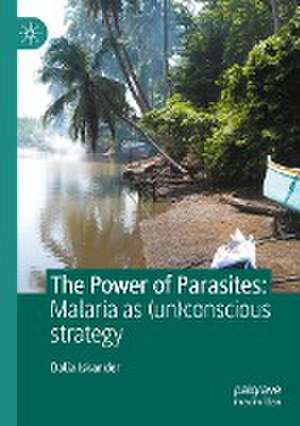The Power of Parasites: Malaria as (un)conscious strategy
Autor Dalia Iskanderen Limba Engleză Paperback – 2 dec 2022
| Toate formatele și edițiile | Preț | Express |
|---|---|---|
| Paperback (1) | 415.39 lei 6-8 săpt. | |
| Springer Nature Singapore – 2 dec 2022 | 415.39 lei 6-8 săpt. | |
| Hardback (1) | 422.90 lei 6-8 săpt. | |
| Springer Nature Singapore – dec 2021 | 422.90 lei 6-8 săpt. |
Preț: 415.39 lei
Nou
Puncte Express: 623
Preț estimativ în valută:
79.48€ • 86.61$ • 66.98£
79.48€ • 86.61$ • 66.98£
Carte tipărită la comandă
Livrare economică 23 aprilie-07 mai
Preluare comenzi: 021 569.72.76
Specificații
ISBN-13: 9789811667664
ISBN-10: 9811667667
Pagini: 217
Ilustrații: IX, 217 p.
Dimensiuni: 148 x 210 mm
Greutate: 0.28 kg
Ediția:1st ed. 2021
Editura: Springer Nature Singapore
Colecția Palgrave Macmillan
Locul publicării:Singapore, Singapore
ISBN-10: 9811667667
Pagini: 217
Ilustrații: IX, 217 p.
Dimensiuni: 148 x 210 mm
Greutate: 0.28 kg
Ediția:1st ed. 2021
Editura: Springer Nature Singapore
Colecția Palgrave Macmillan
Locul publicării:Singapore, Singapore
Cuprins
Chapter 1 Introduction.- Chapter 2 Practices of Oppression.- Chapter 3 Practices of Progress.- Chapter 4 Practices of Development.- Chapter 5 Practices of Professionalization.- Chapter 6 Practices of Equilibrium.- Chapter 7 Conclusion.
Notă biografică
Dr Dalia Iskander is Lecturer in Medical Anthropology at University College London, UK.
Textul de pe ultima copertă
‘This beautifully written account deftly moves between scales and registers to dive into specifics of practices that shape what malaria is, and how this has come to be. Iskander’s impressive contribution with this book is to explicate malaria as a particular bio-social phenomenon: how the non-human world affects change, such that human-defined interventions to target parasites in turn target human relations. The book will be of interest to all scholars of global health as well as medical anthropologists.’
—Clare Chandler, Professor in Medical Anthropology, London School of Hygiene and Tropical Medicine
—Dr Effie Espino, Medical Specialist IV, Research Institute for Tropical Medicine, Department of Health, Philippines
This book describes how malaria both frustrates and facilitates life for Indigenous Pälawan communities living in the forested foothills of the municipality of Bataraza on the island of Palawan in the Philippines. Tracing the arc of malaria on the archipelago from colonial encounters to the present day, it examines the ways in which malaria parasites have become entangled in contemporary lives. It uniquely explores the experiences of local government leaders working towards sustainably developing this last ecological frontier, health workers trying to meet international targets to eliminate malaria, and Pälawan people trying to keep their bodies, social relations and the cosmos in careful balance. In exquisite detail, Dr Dalia Iskander shows how malaria emerged from, and was intrinsic to, a whole host of strategically-orientated social practices that were enacted in as well as around the disease’s name, as people worked day-to-day to gain power in different guises in different arenas.
Caracteristici
Provides unique insights into factors that lead to parasitic diseases being entrenched in human populations Illustrates how malaria is intertwined with Philippine history Will broadly appeal to all scholars of global health as well as medical anthropologists
